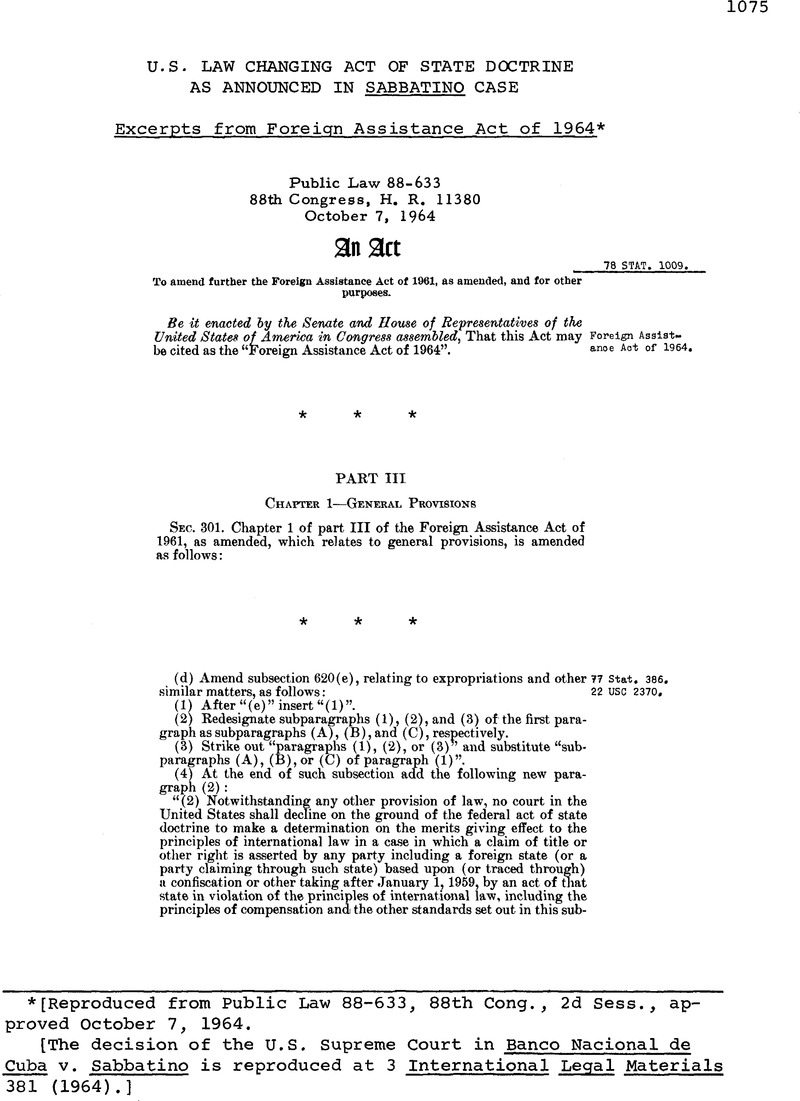No CrossRef data available.
Article contents
U.S. Law Changing Act of State Doctrine as Announced in Sabbatino Case*
Published online by Cambridge University Press: 18 May 2017
Abstract

- Type
- Legislation and Regulations
- Information
- Copyright
- Copyright © American Society of International Law 1964
Footnotes
[Reproduced from Public Law 88-633, 88th Cong., 2d Sess., approved October 7, 1964.
[The decision of the U.S. Supreme Court in Banco Nacional de Cuba v. Sabbatino is reproduced at 3 International Legal Materials 381 (1964).]
References
* [The reference is to Section 620(e)(1), the relevant part of which reads:
“The President shall suspend assistance to the government of any country to which assistance is provided under this or any other Act when the government of such country or any government agency or subdivision within such country on or after January 1, 1962 —
(A) has nationalized or expropriated or seized ownership or control of property owned by any United States citizen or by any corporation, partnership, or association not less than 50 per centum beneficially owned by United States citizens, or
(B) has taken steps to repudiate or nullify existing contracts or agreements with any United States citizen or any corporation, partnership, or association not less than 50 per centum beneficially owned by United States citizens, or
(C) has imposed or enforced discriminatory taxes or other exactions, or restrictive maintenance or operational conditions, or has taken other actions, which have the effect of nationalizing, expropriating, or otherwise seizing ownership or control of property so owned,
and such country, government agency, or government subdivision fails within a reasonable time (not more than six months after such action, or in the event of a referral to the Foreign Claims Settlement Commission of the United States within such period as provided herein, not more than twenty days after the report of the Commission is received) to take appropriate steps, which may include arbitration, to discharge its obligations under international law toward such citizen or entity, including speedy compensation for such property in convertible foreign exchange, equivalent to the full value thereof, as required by international law, or fails to take steps designed to provide relief from such taxes, exactions, or conditions, as the case may be; and such suspension shall continue until the President is satisfied that appropriate steps are being taken, and no other provision of this Act shall be construed to authorize the President to waive the provisions of this subsection.”]
* [Reproduced from U.S. Senate Committee on Foreign Relations, Hearings on S.2659, S.2660, S.2662, and H.R. 11380, “Foreign Assistance 1964,” 88th Cong., 2d Sess., pp. 618-619.]
* [Reproduced from Senate Report No. 1188, Part 1, 88th Cong. 2d Sess. (July 10, 1964), p. 24.]
** [Section 301(d) of the Act as enacted. Ed.]
* [Reproduced from the statement of the House conferees, House of Representatives Report No. 1925, 88th Cong., 2d Sess. (October 1, 1964), p. 16.]




